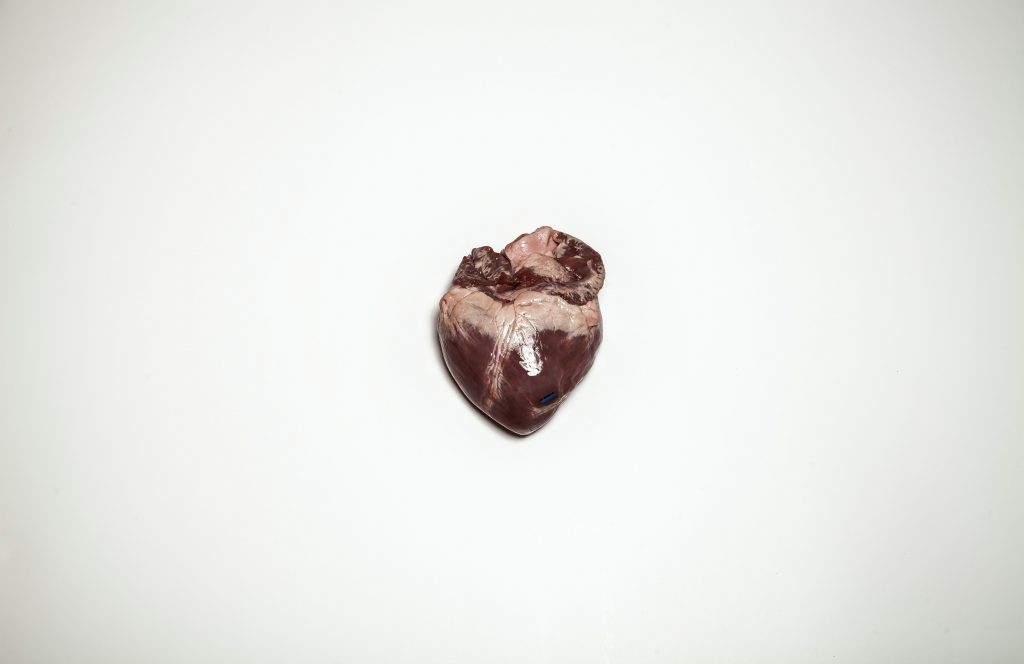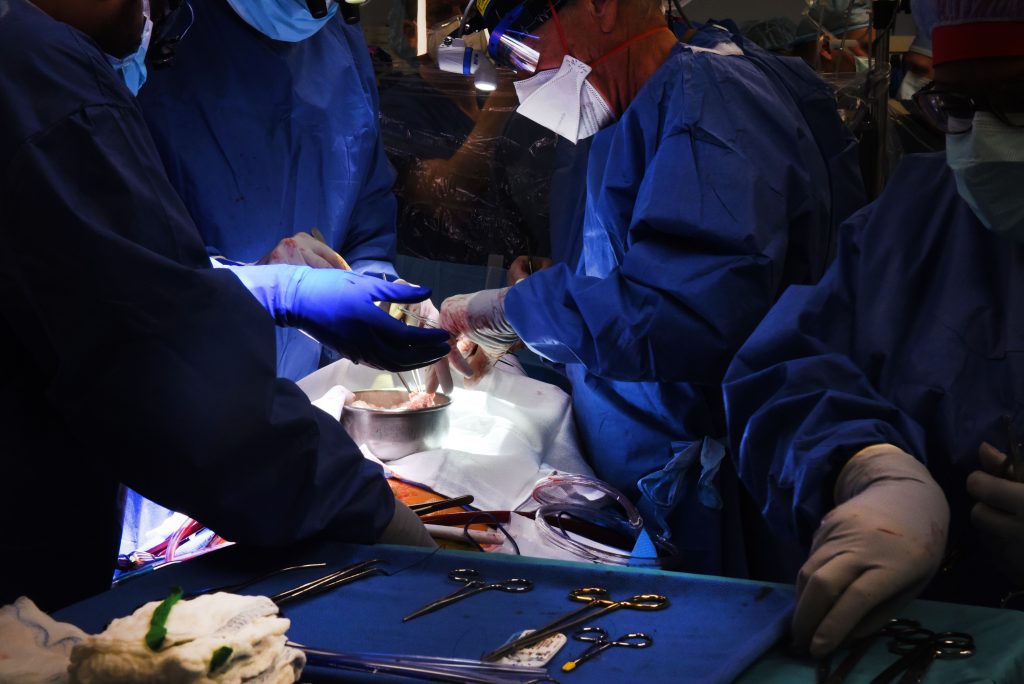The Sick Science of Playing God with Animal-to-Human Organ Transplants


2022 started off as a momentous year for the University of Maryland School of Medicine (UMSOM) and a few of its senior physicians. On January 7, 57-year-old David Bennet received a genetically modified pig’s heart, the first transplant of its kind. Bennet had terminal heart disease and had run out of medical options, aside from xenotransplantation (animal-to-human). Xenotransplantation is far from being FDA approval as a common treatment, but according to a statement from UMSOM, emergency authorization was granted on new years eve through its compassionate use pathway, used for patients with an “immediately life-threatening condition or serious disease or condition to gain access to an investigational medical product.”
The surgery was performed by Bartley P. Griffith, a professor of transplant surgery at UMSOM, accompanied by his superior and other staff. They worked from 8am to 5pm, after which Bennet was closely monitored and left on a heart-lung bypass machine for 48 hours.
The moment was hailed as a landmark in science and medicine; it was expected to provide invaluable data and insight into the further development of xenotransplantation. Most of the media coverage of the operation had emphasized its scientific and medical significance, and potential to save future human lives that would previously be lost due to various insufficiencies such as human organ donor shortages and the incompatibility of animal organs in human bodies.
Griffith himself celebrated his achievement in a sentimental recounting of the journey he took with Bennet, declaring emphatically “I Performed The World’s First Pig Heart Transplant.” A chance at life for Bennet, and fame for Griffith – it was a veritable win-win.
It is not known how much time the transplant will add to Bennet’s life. As of this writing, more than one week later, he is alive. Given that his prospects of survival were determined to be zero, the operation is already considered a success. Griffith writes that Bennet will be in a wheelchair for some time, and is on the maximum course of immunosuppressive medication to prevent his body from rejecting the heart with an immune response.
As it stands, xenotransplantation is highly risky and experimental. The risks are not listed in UMSOM’s official statement, but they include “immune rejection, uncertain efficacy/viability (whether it will work), and whether high levels of immunosuppression will leave the patient vulnerable to more frequent infectious diseases or cancer” (Health Canada).
Beyond these risks, granting they could be eliminated or reduced with more innovation at some point in the future, is xenotransplantation even ethical?
It’s a question hardly raised in most of the coverage the operation has received.
The difference between voluntary human organ donation and xenotransplantation (which by definition could never be consensual), ethically speaking, is enormous. In a medical-ethical landscape that considers the preservation of human life paramount above all other considerations, the advancement of xenotransplantation is unsurprising. But in an alternate landscape that distributes moral consideration more evenly and says one life should not be destroyed in the service of another (without consent), xenotransplantation quickly becomes chilling, and even approaches science fiction.
As told by Griffith, Bennet himself expressed a preference for a human heart transplant. Why couldn’t he get one? According to UMSOM, he was “deemed ineligible for a conventional heart transplant at UMMC as well as at several other leading transplant centers that reviewed his medical records.” The university does not extrapolate on this, but Griffith writes that Bennet “hadn’t been medically compliant in the past and therefore wasn’t up to a standard that we require for human heart transplantation.” This implies that past behavior precluded Bennet being approved for a human heart transplant (ie. it reads as punitive). As justification for pivoting to a pig’s heart and entering an entirely different ethical space, this doesn’t stand up.
Even Griffith acknowledged there is an ethical line somewhere:
“I think people have every right to have opinions and I would humbly and vehemently disagree that this is an animal rights issue. These animals are cloned for the purpose and are treated unbelievably well. They are revered where they are born and they are taken great care of and they know no pain. But I don’t think using subhuman primates is a good idea. These genetically modified pig hearts are what we call the discordant xeno; it’s a mammal but far away from humans. Monkeys and chimpanzees are too close, in my opinion. I would not agree to that level of animal use. But, I’m honestly respectful of the opposite opinion. We have to always be reminded that this is a living creature and we’re taking its life.”
As moral proclamations go, Griffith is all over the place. While his final thought is valid, it undermines everything preceding it. If taking the life of a living creature is morally grave, where is the line of permissibility? For Griffith, it falls somewhere on the continuum of mammalian species, but not too close to humans. It’s a line that seems inoperable and convenient. Awkwardly, his rejection of using nonhuman primates begs for reconciliation with his own chosen field; most of the experimenting of xenotransplantation has occurred on baboons. (Baboon abuse in transplant experiments has been reported at the University of Alabama). Perhaps his position is that use of nonhuman primates for research is permissible, but as organ donors it crosses his line.
This reveals a small but contentious opening in the ethical landscape of xenotransplantation that is reflected by UMSOM:
“Organs from genetically modified pigs have been the focus of much of the research in xenotransplantation, in part because of physiologic similarities between pigs, human, and nonhuman primates.”
Said another way, it is permissible to expropriate pigs’ organs because they are just similar enough to humans, but not too similar. It’s an arbitrary moral threshold that resembles the uncanny valley.
Griffith also mentions that the pigs are cloned, but doesn’t explain its relevance to the animal rights question (that he raised). Pigs presumably remain sentient, intelligent, sensitive and deserving of respect even if cloned (until science genetically engineers the sentience out of them). Does cloning reduce or eliminate the moral standing of a living creature? If so, would it be ethical to clone humans for organs? After all, patients prefer human organs and they require no genetic modifications.
Finally, Griffith’s claims about the treatment of donor pigs are specious at best and aren’t to be taken at face value from someone with financial and career interests in advancing the practice. UMSOM received a $15.7 million grant to “evaluate Revivicor genetically-modified pig UHearts™ in baboon studies” (Revivicor supplied Bennet’s new heart). Revivicor is owned by a $1.4B company called United Therapeutics, located in Silver Spring, Maryland (fittingly the city of the Silver Spring monkey controversy that launched PETA in the 1980’s and put the animal research industry under a microscope). While it calms nerves to assert and believe the animals are treated “unbelievably well” (a revealing choice of words), it’s never rigorous to believe this when there is profit involved. He also doesn’t explain the relevance of how the donor animals are treated while alive to the moral question of killing them and removing their organs.

There is also mixed messaging on the United Therapeutics’ part when considering the animal question. In a (terse) animal welfare statement found in its 2021 corporate responsibility report, United Therapeutics states that it complies “with the “Three Rs” (Replacement, Reduction, and Refinement), widely accepted ethical principles that are now embedded in the conduct of animal-based science in many countries around the world.” These three R’s are traditionally listed in priority order. So if we take the 1st R, replacement, and apply that ethic to xenotransplantation, we can infer that there is a preference for not using animal organs in humans.
The best case scenario would therefore be that there are always enough human donors to meet demand.
But this is not their objective. Nature reports that Revivicor is already building a larger facility to scale up the supply of organs. It is in Revivicor’s financial interest for the organ shortage to persist, and with this landmark surgery, they are on a trajectory to be a preferred supplier as the science advances. The clear conflict here is that the best case scenario does not open up a perennial revenue stream for United Therapeutics and other firms.
There is abundant discourse on policies that would increase human organ donations, that are, as NYU professor of bioethics Arthur L. Caplan writes, “consistent with voluntary, altruistic ethos.”
If we continue down this path, the future of xenotransplantation is a dystopia of mass market genetically modified pigs that are treated, as PETA puts it, warehouses for spare parts. It’s a grim dichotomy that simultaneously deploys reverence for, and indifference to life. But there is money to be made – lots of it – and that train is rarely slowed down.
The organ shortage is no doubt tragic; thousands of people die each year while on waiting lists for organs.
But the question must be asked: saving lives at what cost?
At the physician level, the promise of fame and defying mortality is seductive. At the patient level, most of us instinctively fear death and want to live. Still, a life at all costs paradigm will lead us to insane medical gymnastics (genetically modifying the very fabric of life, pumping people with immunosuppressants, forcing baboons to be laboratories for pig organs). The line between science and science fiction is blurred and eventually disappears altogether. Let us not think that the promises of profit and fame aren’t equally blinding.
The way out of this is a medical-ethical landscape that respects all life and works within brave and dignified constraints to extend human life. Bennet deserves to be wished well. Under the circumstances, his choice to accept a pig heart is understandable. He should not be expected to shoulder the weight of this huge moral dilemma. Looking ahead, in the absence of legislation to outlaw xenotransplantation and a medical field that considers it unthinkable, it will become incumbent on individual patients to bravely say it crosses a line for them. We can work within moral limits, mourn the loss of life when it happens, and say this is the best we could have done.
Bennet passed away on March 8.
One of our country’s most important freedoms is that of free speech.
Agree with this essay? Disagree? Join the debate by writing to DailyClout HERE.




